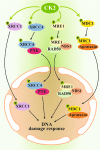Role of protein kinase CK2 in antitumor drug resistance
- PMID: 31277672
- PMCID: PMC6612148
- DOI: 10.1186/s13046-019-1292-y
Role of protein kinase CK2 in antitumor drug resistance
Abstract
Drug resistance represents the major reason of pharmacological treatment failure. It is supported by a broad spectrum of mechanisms, whose molecular bases have been frequently correlated to aberrant protein phosphorylation. CK2 is a constitutively active protein kinase which phosphorylates hundreds of substrates; it is expressed in all cells, but its level is commonly found higher in cancer cells, where it plays anti-apoptotic, pro-migration and pro-proliferation functions. Several evidences support a role for CK2 in processes directly responsible of drug resistance, such as drug efflux and DNA repair; moreover, CK2 intervenes in signaling pathways which are crucial to evade drug response (as PI3K/AKT/PTEN, NF-κB, β-catenin, hedgehog signaling, p53), and controls the activity of chaperone machineries fundamental in resistant cells. Interestingly, a panel of specific and effective inhibitors of CK2 is available, and several examples are known of their efficacy in resistant cells, with synergistic effect when used in combination with conventional drugs, also in vivo. Here we analyze and discuss evidences supporting the hypothesis that CK2 targeting represents a valuable strategy to overcome drug resistance.
Keywords: Antitumor agents; CK2; CKII; Casein kinase 2; DNA repair; Drug resistance; Protein kinase inhibitors.
Conflict of interest statement
The authors declare that they have no competing interests.
Figures




Similar articles
-
Protein kinase CK2 inhibition as a pharmacological strategy.Adv Protein Chem Struct Biol. 2021;124:23-46. doi: 10.1016/bs.apcsb.2020.09.003. Epub 2021 Jan 9. Adv Protein Chem Struct Biol. 2021. PMID: 33632467 Review.
-
Inhibition of protein kinase CK2 by CX-5011 counteracts imatinib-resistance preventing rpS6 phosphorylation in chronic myeloid leukaemia cells: new combined therapeutic strategies.Oncotarget. 2016 Apr 5;7(14):18204-18. doi: 10.18632/oncotarget.7569. Oncotarget. 2016. PMID: 26919095 Free PMC article.
-
Blockade of chemo-resistance to 5-FU by a CK2-targeted combination via attenuating AhR-TLS-promoted genomic instability in human colon cancer cells.Toxicol Appl Pharmacol. 2023 Sep 15;475:116647. doi: 10.1016/j.taap.2023.116647. Epub 2023 Aug 4. Toxicol Appl Pharmacol. 2023. PMID: 37543059
-
Pharmacological inhibition of protein kinase CK2 reverts the multidrug resistance phenotype of a CEM cell line characterized by high CK2 level.Oncogene. 2007 Oct 18;26(48):6915-26. doi: 10.1038/sj.onc.1210495. Epub 2007 May 7. Oncogene. 2007. PMID: 17486073
-
[Casein kinase 2, the versatile regulator of cell survival].Mol Biol (Mosk). 2012 May-Jun;46(3):423-33. Mol Biol (Mosk). 2012. PMID: 22888632 Review. Russian.
Cited by
-
Protein Kinase CK2 in Cancer Energetics.Front Oncol. 2020 Jun 18;10:893. doi: 10.3389/fonc.2020.00893. eCollection 2020. Front Oncol. 2020. PMID: 32626654 Free PMC article. Review.
-
Role of CK2 inhibitor CX-4945 in anti-cancer combination therapy - potential clinical relevance.Cell Oncol (Dordr). 2020 Dec;43(6):1003-1016. doi: 10.1007/s13402-020-00566-w. Epub 2020 Oct 14. Cell Oncol (Dordr). 2020. PMID: 33052585 Free PMC article. Review.
-
CFIm-mediated alternative polyadenylation remodels cellular signaling and miRNA biogenesis.Nucleic Acids Res. 2022 Apr 8;50(6):3096-3114. doi: 10.1093/nar/gkac114. Nucleic Acids Res. 2022. PMID: 35234914 Free PMC article.
-
A Comparative Analysis of Individual RAS Mutations in Cancer Biology.Front Oncol. 2019 Oct 18;9:1088. doi: 10.3389/fonc.2019.01088. eCollection 2019. Front Oncol. 2019. PMID: 31681616 Free PMC article. Review.
-
CK2-mediated phosphorylation of Che-1/AATF is required for its pro-proliferative activity.J Exp Clin Cancer Res. 2021 Jul 15;40(1):232. doi: 10.1186/s13046-021-02038-x. J Exp Clin Cancer Res. 2021. PMID: 34266450 Free PMC article.
References
Publication types
MeSH terms
Substances
Grants and funding
LinkOut - more resources
Full Text Sources
Other Literature Sources
Research Materials

